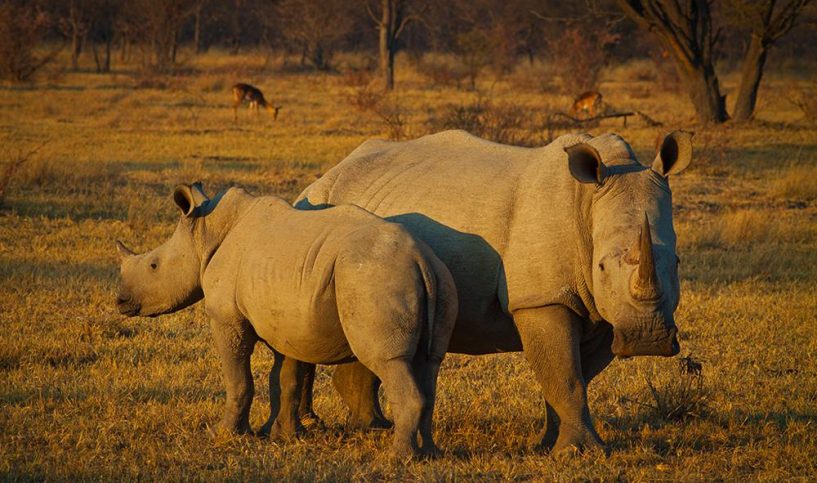With poaching at an all time high and 1215 rhinos killed in 2014 alone, the fight against the slaughter of these defenseless creatures seems all the more desperate. However, sometimes the best way to combat an atrocity of this scale is to take small steps to change the mindset of the world as a whole.
Since its humble beginnings almost 12 years ago, Q8 Books has encouraged reflective thought and provided a safe space for creativity and, more recently, has displayed artwork created by artists in Kuwait, with the aim of promoting local talent. Continuing this trend, the bookshop featured the work of Kuwait English School students who – through their poetry and artwork – became activists in the fight against rhino poaching.
The students were inspired by the work of Harry Owen, a British poet residing in South Africa, who took a great interest in activism through the arts when he was faced with a truly distressing and seemingly hopeless situation.
In 2012, a brutal attack took place in the Kariega Game Reserve in South Africa. Three rhinos were slaughtered by poachers, leaving one dead and two severely wounded. Wildlife vet Dr. William Fowlds attended to Thandi, meaning ‘love,’ and Themba, meaning ‘hope,’ day and night, but unfortunately the latter passed away a few weeks later. When Owen heard of the barbaric act and saw the sickening footage of the agonized creatures, he was thoroughly disturbed. “I thought, I need to do something, but poets don’t do anything!” He then decided to use his skill to create an international platform for any poet – whether world-renowned or an ‘armchair writer’ – to raise worldwide awareness for the slaughter of rhinos for their horns.
For Rhino in a Shrinking World is an international anthology of poetry compiled by Owen and is dedicated to raising awareness of rhino poaching as well as generating funds from each book sold. All proceeds are donated to the Chipembere Rhino Foundation, a nonprofit organization focused on the conservation of Africa’s rhino. The anthology has benefited from significant support from leaders such as Sir Desmond Tutu, who said, “I certainly support [the] campaign against the ghastly attempt at eradicating these splendid creatures so gruesomely.” Advocated by such an influential figure in Africa, the anthology is receiving the coverage necessary for global-scale changes in the attitude toward poaching.
The walls of the retreat-like bookshop were adorned with vibrant pictures of rhinos, meticulously crafted poems and anti-poaching posters created by the children. Almost every piece of work included a colored-in rhino outline, suggesting that although rhinos uniformly are clad in melancholy gray-brown, they are in fact exceptionally unique creatures and extremely significant in how the African wildlife sphere continues to operate.
A clerk at the bookstore, Hamed AlEssa, commented, “Nowadays there is a strong resurgence of literature and literary movements in Kuwait and a lot more people are interested in expressing themselves and sharing their ideas through the written word.”
“This display was interesting in particular because it raised an international conservation issue rather than a purely local concern. When students and individuals are more exposed to international matters and cultures, they have the opportunity to become global citizens and participate in worldwide movements.”
AlEssa also touched on the “fresh perspective” of a child and how significant it can prove to be in the sustainable fight against poaching. The only way that rhinos and other endangered creatures will live on, is if the enthusiasm and compassion fostered in young people does as well.
Arló Steyn, a qualified ranger working in South Africa, believes that a love for the animals is essential for any progress to be made. He stated, “To combat rhino poaching we must create a sense of pride for the animals’ wellbeing in the reserve’s staff, the militant force and those supporting the case from afar.”
On January 13, Thandi, one of the rhinos surviving the brutal attack in 2012, gave birth to a healthy female calf. Perhaps our small steps toward a poach-free world can ensure a full and happy life for the little calf, a sign of hope in rhino form.
To explore the online anthology of “For Rhino in a Shrinking World’, make sure to visit it online at: rhinoanthology.wordpress.com. You can also follow Harry Owen on Facebook and Q8 Books on Instagram and Twitter @q8bookstore.
Although some cultures attempt to use rhino horn for medicinal purposes, as aphrodisiacs and for ornamental features, IT IS OF NO USE TO ANYONE EXCEPT THE ORIGINAL OWNER. If you are aware of any illegal trading of rhino horn, please contact the Environment Public Authority (EPA) in Kuwait on 2482 0580 or by email at dg@epa.org.kw. Alternatively, contact the Director of Airport Customs at 2471 7408 or by email: kdalsaif@hotmail.com.








